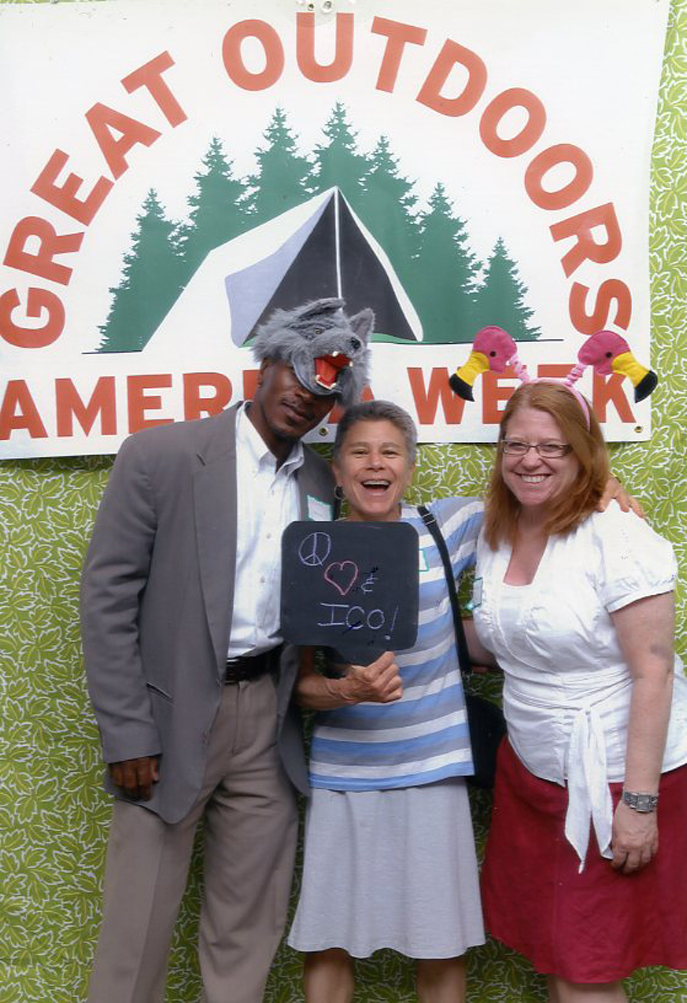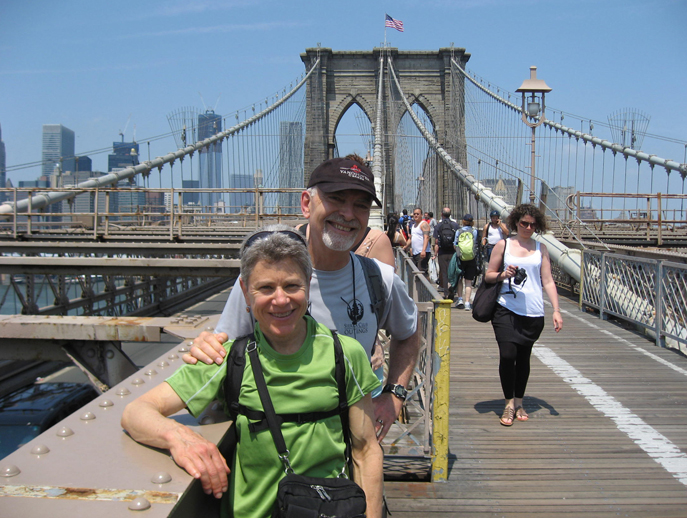
Debra Asher and her husband, John, on the Brooklyn Bridge, New York City
Debra Asher, among the Sierra Club's longest-serving staffers and manager of the Inspiring Connections Outdoors (ICO) program for 28 years, retired in mid-March. The Planet sat down to talk with her a few weeks before she hung up her ICO spurs.
The Planet: Where did you grow up?
Asher: North Hollywood, California.
Planet: Were you outdoorsy as a kid? Did your parents take you hiking, camping, canoeing, or on trips to national parks?
Asher: No, I wasn't particularly outdoorsy, nor were my parents. I wanted to go places but my parents weren't big travelers or outdoor types. I started to become an outdoorsy person on my own with my peers after high school. The summer after I graduated from high school I researched -- and this was prior to the Internet, mind you -- taking a six-week American Youth Hostel bicycle trip through New England and Quebec. My parents supported my going and assisted me as needed, but I figured out the trip logistics, made the arrangements via letter and telephone, got the bike, etc., on my own. I wanted to see a different part of the country and I'd heard a lot about the American Youth Hostel Association.
That was my first adventure on my own, and then I left home to go to college at San Francisco State, and I haven't lived in Southern California since. I wasn't sure what I wanted to do with my life, so I took a year off from school to work. I traveled across the country with a friend, listening to Lou Reed the entire way, to get to New York to start our three-month trip through Europe together. On returning to school, I chose Spanish as a major, eventually earning a Master's Degree in English as a Second Language (ESL) while working at the American Language Institute at S.F. State. After school I decided to stay in the Bay Area, living first in Berkeley, then in Oakland, and finally in San Francisco, working all the while as an ESL teacher, mostly with adults through the community college system.
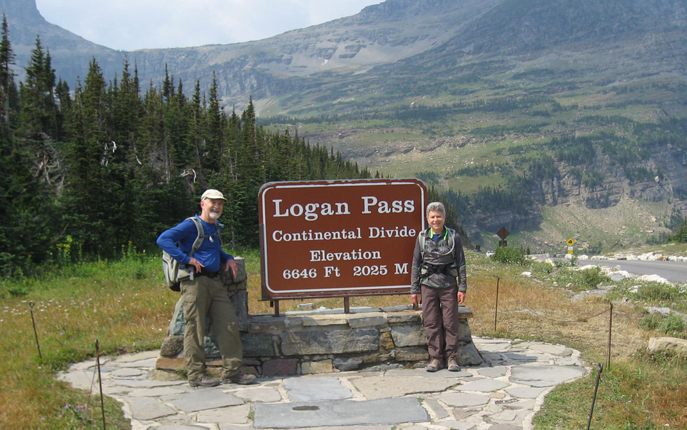
John and Debra at Logan Pass, Glacier National Park, Montana
Planet: How did you first get involved with the Sierra Club?
Asher: After I got my Master's degree, I taught briefly at a private language school at Mills College (Japanese students), but then taught adults -- mostly "boat people" from Vietnam and Cambodia (this was during the Southeast Asian refugee era). But I was forever getting laid off and rehired, laid off and rehired, so I decided to look for something more permanent. I knew I didn't want to work for a big downtown corporation, mostly because I had no wardrobe for it, so I was looking at nonprofits, and one day I spotted a job opening at the Sierra Club for an entry-level development job. (This was 1986, when the Club was at 730 Polk Street.) In time, I was promoted to a corporate-relations fundraising job. I liked the atmosphere at the Sierra Club and I learned a lot about fundraising and environmental campaigns. But when a job in Outings opened up, I thought, "this is what I always associated the Sierra Club with: getting outdoors." At the time, Outings jobs were considered very prized -- there were very few job openings because nobody ever left. In May 1988 I was offered the job of Inner City Outings coordinator. (The program's name has since been changed to Inspiring Connections outdoors. When the ICO program began in the 1970s, "inner city" did not have the connotations it does now.)
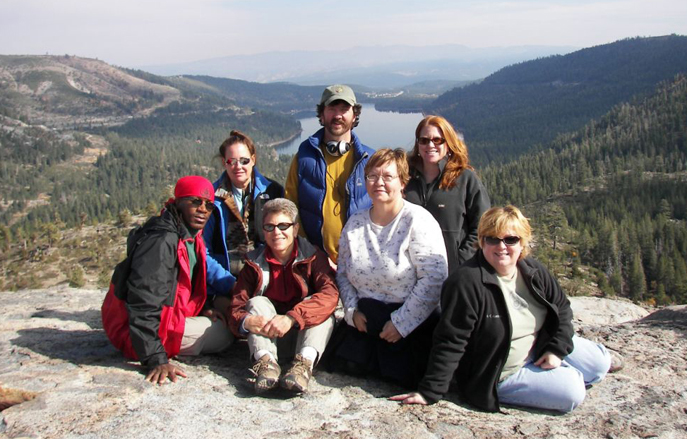
With ICO volunteer leaders near Donner Pass, overlooking Donner Lake, Sierra Nevada, California
Planet: Tell us about the ICO program when you started working there.
Asher: I think there were 10 ICO groups, max. It was recognized as a Sierra Club program, but there were no national leader standards, no standards for leading trips, no standards for fundraising -- the whole leadership was volunteer-dominated, meaning the staff (me and, before me, a part-time person) was really just thought of as support for the volunteers. Because I've been here so long I've seen ICO evolve to have a much greater national presence, staff oversight -- for example, leader standards, a training curriculum, standardized forms, and much more national oversight and support. This is particularly so over the last five years. Now there are more than 50 ICO groups in 26 states and in Washington, D.C., and we continue to expand. We just started our newest ICO group in Boise, Idaho.
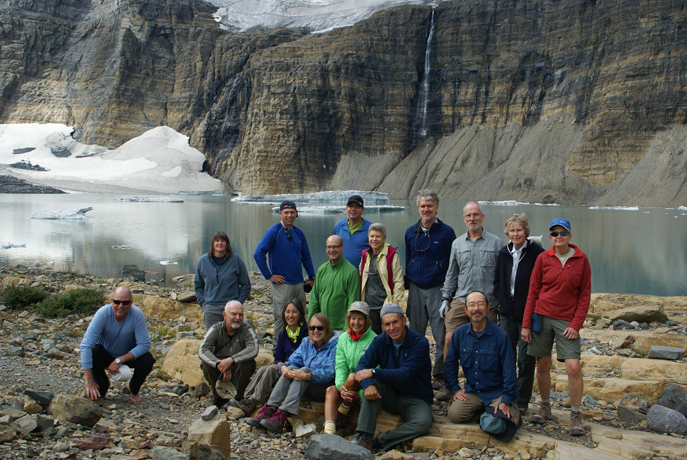
Sierra Club outing in Glacier National Park, Montana
Planet: Have you led ICO trips or other Sierra Club Outings?
Asher: No I haven't. I've been on Sierra Club national trips and ICO trips, but not as a leader. My interest isn't in leading trips so much as in participating. I enjoy getting outdoors by myself and with friends and family, and when I go on an organized trip I like the idea that someone who knows the area well can show it to me. I enjoy being with other people, but I take many, many urban walks by myself, especially in San Francisco, where I live. It gives me time to think and get some "alone time" in my busy life, as well as explore neighborhoods and "secret" places with others. I use the outdoors as a way to be by myself in the city. But I've been on many, many national Sierra Club trips with other people that have been wonderful and thoroughly enjoyable.
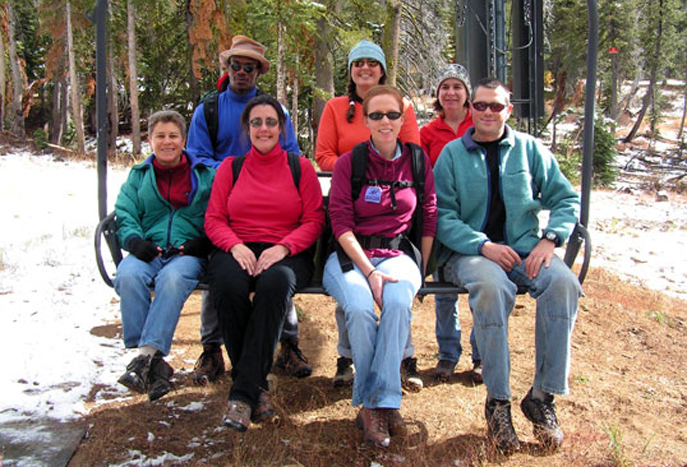
Debra with ICO leaders
Planet: Why is the ICO program -- and getting kids outdoors in general -- so important?
Asher: I think number one, it's really important for kids to be physical and use their bodies in a setting that's not what they're used to. These days everything is so structured and managed -- sports, for instance -- and often it involves competition and a lot of gear. But with ICO, all you have to do is walk, and there's someone to lead you and someone to share it with. Our hope is that ICO provides an experience that will be memorable and fun and that young people, once exposed to being outdoors in nature, will want to continue doing it.
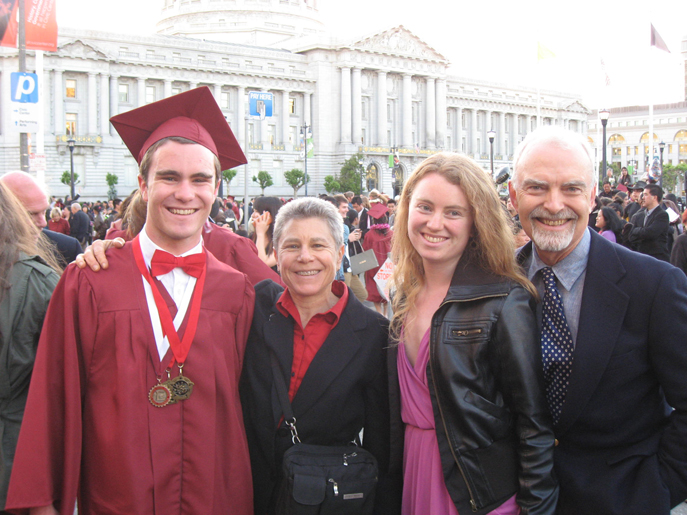
Son Aaron, Debra, daughter Rachel, and John at Aaron's high school graduation in San Francisco
Our goal now is to make sure everybody, no matter their background or circumstances, has access to the outdoors. ICO has been around for 30 years, and only now is research being done about the importance of getting outdoors, breathing fresh air, getting off technology. ICO has been laying the groundwork for getting outdoors safely and having fun for a long time. It doesn't have to be a 5-hour drive and a 10-mile backpack. It can be just getting away from home or school and exploring a nearly city park or state park, away from all the things you depend on at home. And it does develop confidence, maturity, and emotional skills for young people to set up camp, cook outside, walk for 10 miles, and support other people on the trip. ICO evens the playing field if you're new to the outdoors. I read numerous stories from ICO leaders who say that even with all the work and preparation it takes to be an ICO leader, once they're on the outing and seeing the kids' experience sleeping outdoors for the first time, or seeing a natural body of water like a lake or a stream for the first time, makes it all worthwhile. Being an ICO leader is a very, very demanding volunteer job. Sometimes I'm amazed that so many ICO leaders continue doing it. Clearly it's immensely satisfying.
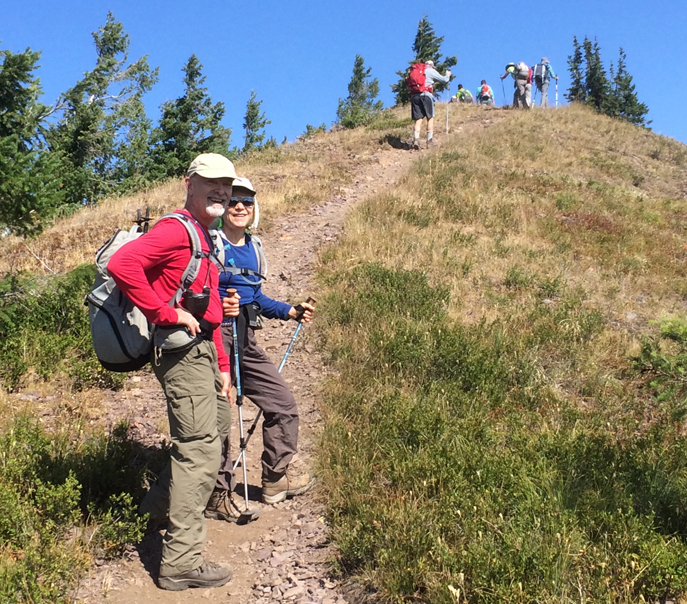
John & Debra climbing Huckleberry Mountain, Glacier National Park, Montana
Planet: What's next for you?
Asher: My stock answer is that I'm going to start the next phase of my life while I'm in good health. I'm going to take my time figuring it out. I feel fortunate to be be able to retire. And I feel fortunate to be leaving the ICO program as it is now, and after 30 years it's ready for fresh faces, and new ideas -- and I, too, will be starting my next phase of life with many adventures ahead. My husband is retired, and my kids are thriving and independent (although you never know; they may be back). We have a list of places we want to go in the Southwest, the Southeast, the Pacific Northwest, a Civil War trip, Spain, Italy, Ireland. I'm sure I'll be volunteering somewhere in the future and perhaps brushing up on my Spanish. But for now, I want to take hikes on weekdays, drink coffee for an hour in the morning at home -- and go to Giants weekday baseball games!
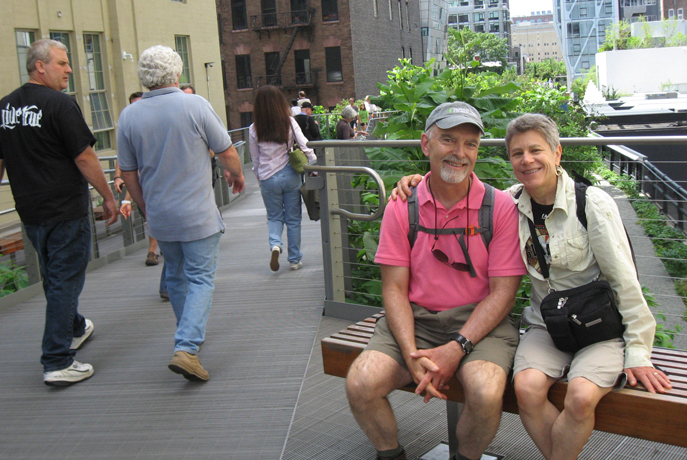
John and Debra on the High Line, New York City
Planet: What would you say to Sierra Club volunteers who are thinking of getting involved with ICO?
Asher: It's a big commitment, but there are so many who've been doing this for many, many years, and they do it because it gives them so many rewards. Sometimes it seems like it's just a small thing when you consider all the troubles the world is dealing with but, believe me, the kids who ICO leaders have touched do have an impact and it extends beyond ICO. The ICO experience really does make the world a better place.
